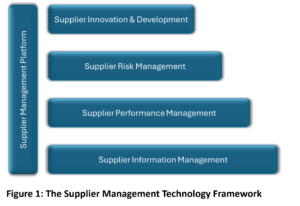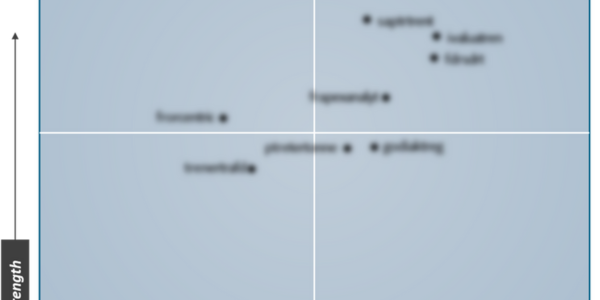Today I’m happy to announce the official launch of our Supplier Management Tech Advisor report for 2025!
Ardent Partners evaluated the market’s top Supplier Management solution providers’ Solution Strength (the ability to support the full scope of Supplier Management activities, as defined by Ardent Partners’ Supplier Management Framework — discussed below) and Provider Strength (which includes factors such as execution ability, client success, ownership, references, and product vision).
The eight providers and their distinct solutions included in this report are:
- apexanalytix
- Corcentric
- GEP
- Graphite Connect
- Ivalua
- Kodiak Hub
- SAP
- Synertrade
Participating companies were asked to complete a robust RFI questionnaire covering all aspects of their solution. Areas of focus included the four core components of a supplier management solution (see the Supplier Management Framework below), general technical and platform capabilities, reporting & analytics, and solution roadmap. Ardent Partners conducted in-depth customer interviews with each of the participating solution providers. Ardent’s analyst team also participated in detailed briefings and solution demonstrations to gain a complete company overview as well as an in-depth understanding of specific solution capabilities.
Supplier Management Framework
In a market driven by innovation, specialization, and globalization, a business’ suppliers have a more direct and immediate impact on its own operations, financial performance, and customer satisfaction than ever before. While businesses generally understand and acknowledge the fact that their supply base generates value for the enterprise (also, that strategic suppliers actually exist), the reality, as seen in Ardent Partners’ market research, is that few organizations do a very good job managing their strategic suppliers while a larger number do a poor job of managing them. The premise behind this report is, in fact, to help procurement organizations find the right tools to change that.
At the same time, there has been an increase in regulatory requirements and a spike in fraud (since the pandemic) as well as heightened geopolitical uncertainty and conflict. This means that it’s more important than ever to manage suppliers and have correct and up-to-date supplier information to ensure regulatory compliance, minimize fraud and risk, and ensure that systems and automation work as efficiently as possible.
Ardent Partners defines supplier management as the series of processes related to the holistic management of supplier relationships. It includes managing supplier information, performance, and risk as well as supporting and nurturing supplier innovation and development.
To effectively and efficiently manage these processes across the entire supply base, supplier management technology is needed. Given the wide scope and complexity of supplier management, Ardent Partners has defined four components of a supplier management solution: supplier information management (SIM), supplier performance management (SPM), supplier risk management, and supplier innovation and development, supported by a common set of platform capabilities (see Figure 1). The components also build on each other, where both supplier performance and risk management leverages supplier information management capabilities to gather the necessary information.

Supplier Information Management (“SIM”) is critical from different perspectives. Firstly, a certain set of information is necessary to do business with a supplier, including obvious things like supplier name and contact information for purchase orders and invoices, but can also include more specific information depending on what is being ordered and what systems are being used (e.g., different information is needed for direct material suppliers vs. non-critical service providers). Secondly, there is the information that is needed to ensure and maintain for better compliance, risk, and performance management purposes. The supplier information is typically captured in a supplier “profile.” The scope of these profiles will vary depending on enterprise requirements, supplier criticality, and the different roles of suppliers in the supply chain.
Supplier Performance Management (“SPM”) is focused on measuring and managing supplier performance. As with any type of supplier management component, supplier performance management requirements vary between organizations and industries. For example, manufacturing organizations typically go deeper and into more granular detail in measuring supplier performance, have more data-driven KPIs, and integrate supplier performance as a larger part of quality programs such as APQP. Likewise, SPM is very important for non-manufacturing organizations (and indirect spend categories), but quality and performance can be harder to quantify and more subjective.
Supplier Risk Management is one of the most complex areas in the entire procurement technology space because risk management spans multiple areas, such as financial, regulatory, geopolitical, or supply risk, and can be defined, tracked, and managed in many different ways. And there are many different types of risks (i.e., intellectual property, cyber security, and ESG) that extend beyond procurement’s remit and need to be managed holistically across the enterprise operation.
Encouraging and supporting Supplier Innovation and Development is becoming more and more important as the marketplace demands persistent innovation from each competing supply chain. Aligning the suppliers’ expertise and know-how in a structured and organized way to gain the best advantage in the delivery of its own products and services is a competitive advantage but may soon be table stakes. Fostering innovation challenges across a larger set of suppliers or more targeted suppliers or product development projects is an important tool to have in the category management toolbox.
To support these four components several common platform capabilities are needed. These core capabilities include features like flexible workflows and data models, integrations, communication functionality, project and campaign management as well as analytics and reporting.
Access the Report Today
This report contains inputs on usability, solution functionality, completeness of offering, innovation, customer reviews, company presence, and ability to execute, as well as company focus and future solution strategy. It details the key considerations needed to properly evaluate and select a strategic sourcing solution and guides enterprise teams to make smart technology investments.
The report is now available for purchase in the Ardent Partners Research Library.

